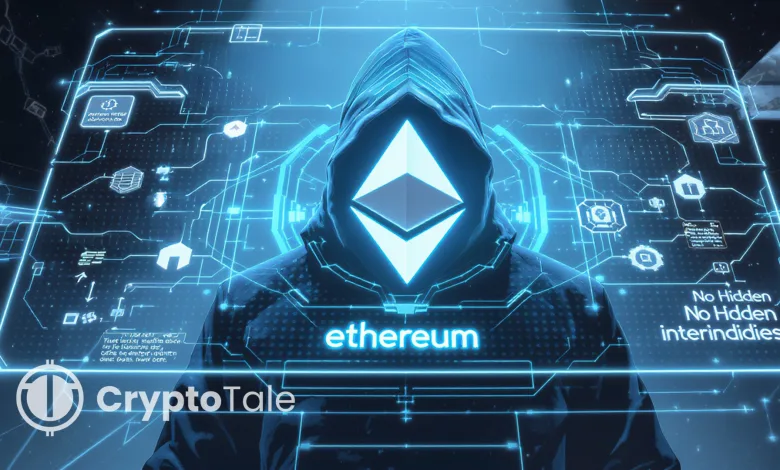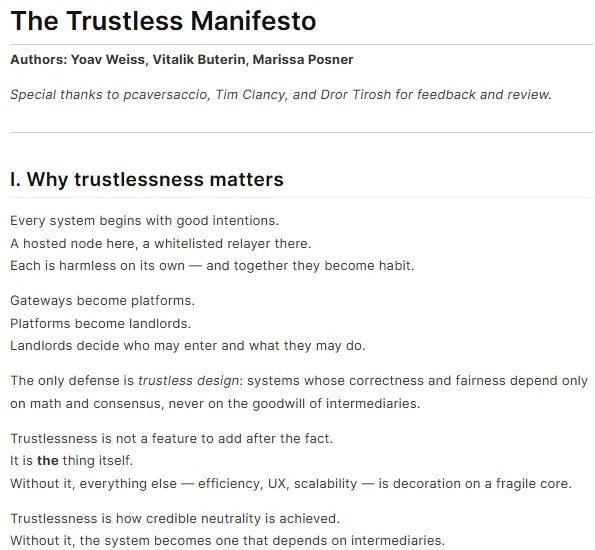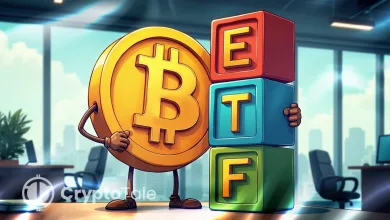Ethereum Sets Trustless Standard With New On-Chain Manifesto

- Ethereum sets a new on-chain standard that removes hidden operators and private control.
- The Trustless Manifesto gives strict rules for open networks with full public verification.
- Users may pledge support through a contract that protects autonomy and open access.
A new chapter in blockchain governance opened after the Ethereum Foundation and Vitalik Buterin published the Trustless Manifesto on the Ethereum network. The document sets strict values for decentralized protocols and calls for a renewed commitment to systems that depend only on self-custody, open verification, and permissionless participation. It also introduces a permanent smart contract at address trustlessmanifesto.eth, which contains the full text and allows users to pledge support without incentives.

Source: Trustlessness.eth.
Core Laws Behind Trustless Design
The manifesto defines a trustless system as one where any honest participant can join, verify, and act without asking for approval. It states that such a system must protect user autonomy with a clear structure that avoids hidden intermediaries or protected actors. Developers are urged to avoid private servers, opaque relayers, and hosted nodes that create new trust dependencies.
The document introduces three strict laws. First, no protocol step should rely on private information held by a single actor. Second, every operator must remain replaceable and open for participation. Third, any state transition must be reproducible from public data so that users can confirm results without relying on external statements.
These laws frame the boundaries between decentralized protocols and controlled platforms. They show how trust can shift from code to individuals once central components enter a system. The authors explain that small compromises often grow into permanent choke points that reshape how users interact with a chain.
Expanded Principles for Decentralised Systems
The manifesto elaborates on a number of necessary conditions for the realization of trustless coordination. The first condition, self-sovereignty, is that users can authorize their own actions, and no service person can do it on their behalf. Moreover, the requirement of verifiability is also presented, which allows anyone to validate the events merely by accessing the public data without being dependent on private checks.
Next, it introduces the walkaway test. This test ensures that if one operator fails, another can continue operations without waiting for approval. It keeps participation open and secure. It also requires accessibility for regular users to join without specialized servers or large capital.
The authors also describe censorship resistance. Any valid action must reach the chain within a reasonable timeframe and without unnecessary cost. They also call for transparency of incentives so that participants operate through protocol rules instead of private agreements or hidden APIs.
According to the manifesto, removing any of these conditions drifts a system away from a protocol and toward a controlled platform. It warns that each compromise creates a new point of dependency.
Related: Vitalik Buterin Warns of Off-Chain Blockchain Risks
On-Chain Pledge and Structural Commitment
The manifesto contract is stored permanently on-chain and contains no owner, no administrator, and no editable components. The single function, pledge(), records the caller’s address and timestamp in a public event. It offers no rewards, no points, and no airdrops.
Users who call pledge() show support for user-authorized operations and open verification. They also accept the cost required to maintain Ethereum trustless.
The manifesto also states that Ethereum was created so that people could coordinate without relying on intermediaries. It explains that trustlessness is not optional; it’s the foundation on which decentralized systems stand.




